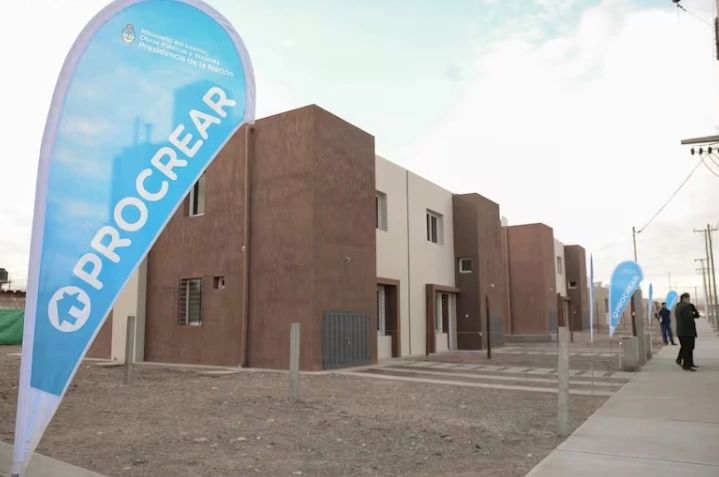BuySellBA
Administrator
The implications and risks of the lack of a national housing strategy - La Nacion Propiedades

August 20, 2025
At the beginning of the year, the Secretariat of Territorial Development and Housing was closed and today programs such as Casa Propia, Argentina Construye and Suelo Urbano, among others, were dissolved.
By Ricardo Daniel Andino

The Government dissolved housing programs. Shutterstock
Several months ago, the National Executive Branch issued Decree 70/2025, by which, among other measures, it dissolved the Secretariat of Territorial Development and Housing by removing it from the areas of the Ministry of Economy , since it no longer exists within the list of dependencies in article 1. It then completed this decision in article 8 by eliminating the objectives of said Secretariat and of the Undersecretariats of Territorial Development and Habitat and Housing, adding new responsibilities to the current Secretariat of Public Works , which thus assumes certain powers of the dissolved Secretariat.
Thus, the topics - or objectives, if the decree is drafted - that comprise the universe of habitat and housing, listed in Article 5, are: 1: land (and its survey and regularization, pursuant to sections 33 and 37), 2: housing infrastructure works, which are not defined (see paragraph 36), and 3: the completion, closure, and transfer of programs and projects related to territorial development, habitat, and housing (see paragraphs 34 and 35) , now under the exclusive jurisdiction of the Secretariat of Public Works.
In addition, there is still a department dedicated in some way to certain issues related to habitat and housing: the Undersecretariat of Socio-Urban Integration, whose objectives are detailed as Annex II in a table that complements article 7 of decree 70/25. These objectives, briefly stated, are: to understand the design and implementation of policies , the urban transformation of neighborhoods , the strengthening of community organizations, the implementation of initiatives aimed at linkage and productive development, and the administration and management of the National Registry of Popular Neighborhoods in the Process of Socio-Urban Integration (RENABAP). In addition, this Undersecretariat must participate in the design and execution of urban infrastructure and habitat improvement projects and policies for access to housing solutions.

The Procrear program had already been dissolved at the end of last year and today the Government dissolved more programs such as Casa Propia, Argentina Construye, among others.
Furthermore, as is well known, the Argentine legal framework requires that all norms inferior to the National Constitution be subordinated to it, both in letter and spirit. The 1994 constitutional reform incorporated certain international treaties that "do not repeal any article of the first part of this Constitution and must be understood as complementary to the rights and guarantees recognized herein" (Article 22, paragraph 75 of the Constitution). Consequently, the international treaties listed in the same Article 22 have acquired a certain constitutional hierarchy and are superior to any inferior norm that might contradict or ignore them.
One of the treaties expressly mentioned in Article 22 is the International Covenant on Economic, Social and Cultural Rights (ICESCR). This Covenant, in addition to being the most relevant in the area of housing and habitat, has a notable feature: it has an implementing body, the Committee on Economic, Social and Cultural Rights (CESCR), which expresses its views through General Comments (GOs), which constitute the official international interpretation of the Treaty, as expressly recognized in Argentina by the Supreme Court of Justice itself in the "Aquino" case, among others. Thus, the CESCR's General Comments "integrate" the Treaty and thus have constitutional status in the Argentine Republic.
There are two General Observations specifically referring to Housing: OG No. 4 and OG No. 7, and in both the CESCR elaborates extensively on the characteristics of the right to housing and on certain requirements for housing to be considered “adequate” (expanding the “dignified” requirement contemplated by art. 14 bis of the CN) and lists, defining them, the following: a) legal security of tenure, b) availability of services, materials, facilities and infrastructure, c) bearable expenses, d) habitability, e) affordability, f) location and g) cultural adequacy (points 6, 7 and 8, OG No. 4).

Argentina, as a State Party to international treaties, must adopt a “national housing strategy”. Shutterstock
There is an express provision of the CESCR that is worth highlighting to verify whether national regulations on housing and habitat—for example, those arising from Decree 70/25—are adequate and comply with the standards established by said committee. This is point 12 of GC No. 4, which determines that Argentina, as a State Party to the Treaty, must adopt a "national housing strategy" necessary to comply with all other obligations arising from the ICESCR. It does so clearly, expressing it as follows:
“While the most appropriate means of achieving the full realization of the right to adequate housing will inevitably vary from one State Party to another, the Covenant clearly requires each State Party to take all necessary measures to that end. This will almost invariably require the adoption of a national housing strategy which, as the Global Housing Strategy states in paragraph 32, “defines the objectives for the development of housing conditions, determines the resources available to achieve those objectives and seeks the most cost-effective use of those resources.” In addition, it will establish responsibilities and a timetable for implementing the necessary measures." For reasons of ownership and effectiveness, as well as to ensure respect for other human rights, such a strategy should reflect extensive consultation with and participation of all affected persons, including those experiencing homelessness, those experiencing inadequate housing, and their representatives. Furthermore, measures should be taken to ensure coordination between ministries and regional and local authorities in order to reconcile related policies (economy, agriculture, environment, energy, etc.) with the obligations arising from Article 11 of the Covenant.

The right to housing must be applied and guaranteed to all.
Decree 70/25 seems to be aimed more at a readjustment of administrative powers (which in itself and as such is unobjectionable) than at establishing a national housing “strategy” - or a policy, if you will - as required by point 12 of GC No. 4 of the CESCR and although certain and various statements by the competent officials and certain actions within the framework of the general economic policy clearly aim at market freedom, the strengthening of the currency, the reduction of inflation and, with it, the reappearance of mortgage credit, with all the approval that these measures were received and will continue to be received, it seems, in light of the express provisions of the ICESCR already cited and others that advance in the same direction, that insofar as “... the right to housing must apply to all (point 6 of GC No. 4) and considering that …” the inherent human dignity of persons... demands that the term “housing” be interpret it in a way that takes into account various other considerations and mainly that the right to housing must be guaranteed to all , regardless of their income or access to economic resources" (point 7 of OG No. 4), complying with the ICESCR requires more than putting the organizational chart in order, reducing public spending, establishing a welcome order in the general economy, laying the foundations so that mortgage credit decisively facilitates the acquisition of housing for those who can access it or freeing rental from the ties that made it almost non-existent as a tool for obtaining a place to live.
Everything done in macroeconomic terms is undoubtedly contributing to alleviating the housing situation of a socioeconomic segment of our society that has the necessary resources. But full compliance with constitutional mandates also requires sound administrative order and a reduction in bureaucratic expenses, accompanied by explicit statements about a policy or strategy that also considers those who, due to their limited resources, cannot avail themselves of the financial tools offered by the market . In other words, the right to housing must be applicable to "everyone," as required by constitutional norms such as the ICESCR. And such recognition must not be purely abstract, but enshrined in concrete measures: resource allocation, timelines for implementing measures, and coordination with all public and private entities with an interest and jurisdiction in the matter.
Therefore, it is timely and pertinent to urge and urge the competent authorities to make public the measures aimed at enshrining the right to housing in our country, as mandated by the ICESCR, and, where appropriate, to urgently call upon those who can provide proposals, studies, and analyses that will contribute to the task of implementing everything necessary to this end.
Failure to do so, in addition to failing to comply with a constitutional mandate, exposes the Argentine Republic to being sued before international bodies with jurisdiction to adjudicate any failure by a State Party to fulfill its obligations under an international treaty.
www.buysellba.com
August 20, 2025
At the beginning of the year, the Secretariat of Territorial Development and Housing was closed and today programs such as Casa Propia, Argentina Construye and Suelo Urbano, among others, were dissolved.
By Ricardo Daniel Andino

The Government dissolved housing programs. Shutterstock
Several months ago, the National Executive Branch issued Decree 70/2025, by which, among other measures, it dissolved the Secretariat of Territorial Development and Housing by removing it from the areas of the Ministry of Economy , since it no longer exists within the list of dependencies in article 1. It then completed this decision in article 8 by eliminating the objectives of said Secretariat and of the Undersecretariats of Territorial Development and Habitat and Housing, adding new responsibilities to the current Secretariat of Public Works , which thus assumes certain powers of the dissolved Secretariat.
Thus, the topics - or objectives, if the decree is drafted - that comprise the universe of habitat and housing, listed in Article 5, are: 1: land (and its survey and regularization, pursuant to sections 33 and 37), 2: housing infrastructure works, which are not defined (see paragraph 36), and 3: the completion, closure, and transfer of programs and projects related to territorial development, habitat, and housing (see paragraphs 34 and 35) , now under the exclusive jurisdiction of the Secretariat of Public Works.
In addition, there is still a department dedicated in some way to certain issues related to habitat and housing: the Undersecretariat of Socio-Urban Integration, whose objectives are detailed as Annex II in a table that complements article 7 of decree 70/25. These objectives, briefly stated, are: to understand the design and implementation of policies , the urban transformation of neighborhoods , the strengthening of community organizations, the implementation of initiatives aimed at linkage and productive development, and the administration and management of the National Registry of Popular Neighborhoods in the Process of Socio-Urban Integration (RENABAP). In addition, this Undersecretariat must participate in the design and execution of urban infrastructure and habitat improvement projects and policies for access to housing solutions.

The Procrear program had already been dissolved at the end of last year and today the Government dissolved more programs such as Casa Propia, Argentina Construye, among others.
Furthermore, as is well known, the Argentine legal framework requires that all norms inferior to the National Constitution be subordinated to it, both in letter and spirit. The 1994 constitutional reform incorporated certain international treaties that "do not repeal any article of the first part of this Constitution and must be understood as complementary to the rights and guarantees recognized herein" (Article 22, paragraph 75 of the Constitution). Consequently, the international treaties listed in the same Article 22 have acquired a certain constitutional hierarchy and are superior to any inferior norm that might contradict or ignore them.
One of the treaties expressly mentioned in Article 22 is the International Covenant on Economic, Social and Cultural Rights (ICESCR). This Covenant, in addition to being the most relevant in the area of housing and habitat, has a notable feature: it has an implementing body, the Committee on Economic, Social and Cultural Rights (CESCR), which expresses its views through General Comments (GOs), which constitute the official international interpretation of the Treaty, as expressly recognized in Argentina by the Supreme Court of Justice itself in the "Aquino" case, among others. Thus, the CESCR's General Comments "integrate" the Treaty and thus have constitutional status in the Argentine Republic.
There are two General Observations specifically referring to Housing: OG No. 4 and OG No. 7, and in both the CESCR elaborates extensively on the characteristics of the right to housing and on certain requirements for housing to be considered “adequate” (expanding the “dignified” requirement contemplated by art. 14 bis of the CN) and lists, defining them, the following: a) legal security of tenure, b) availability of services, materials, facilities and infrastructure, c) bearable expenses, d) habitability, e) affordability, f) location and g) cultural adequacy (points 6, 7 and 8, OG No. 4).

Argentina, as a State Party to international treaties, must adopt a “national housing strategy”. Shutterstock
There is an express provision of the CESCR that is worth highlighting to verify whether national regulations on housing and habitat—for example, those arising from Decree 70/25—are adequate and comply with the standards established by said committee. This is point 12 of GC No. 4, which determines that Argentina, as a State Party to the Treaty, must adopt a "national housing strategy" necessary to comply with all other obligations arising from the ICESCR. It does so clearly, expressing it as follows:
“While the most appropriate means of achieving the full realization of the right to adequate housing will inevitably vary from one State Party to another, the Covenant clearly requires each State Party to take all necessary measures to that end. This will almost invariably require the adoption of a national housing strategy which, as the Global Housing Strategy states in paragraph 32, “defines the objectives for the development of housing conditions, determines the resources available to achieve those objectives and seeks the most cost-effective use of those resources.” In addition, it will establish responsibilities and a timetable for implementing the necessary measures." For reasons of ownership and effectiveness, as well as to ensure respect for other human rights, such a strategy should reflect extensive consultation with and participation of all affected persons, including those experiencing homelessness, those experiencing inadequate housing, and their representatives. Furthermore, measures should be taken to ensure coordination between ministries and regional and local authorities in order to reconcile related policies (economy, agriculture, environment, energy, etc.) with the obligations arising from Article 11 of the Covenant.

The right to housing must be applied and guaranteed to all.
Decree 70/25 seems to be aimed more at a readjustment of administrative powers (which in itself and as such is unobjectionable) than at establishing a national housing “strategy” - or a policy, if you will - as required by point 12 of GC No. 4 of the CESCR and although certain and various statements by the competent officials and certain actions within the framework of the general economic policy clearly aim at market freedom, the strengthening of the currency, the reduction of inflation and, with it, the reappearance of mortgage credit, with all the approval that these measures were received and will continue to be received, it seems, in light of the express provisions of the ICESCR already cited and others that advance in the same direction, that insofar as “... the right to housing must apply to all (point 6 of GC No. 4) and considering that …” the inherent human dignity of persons... demands that the term “housing” be interpret it in a way that takes into account various other considerations and mainly that the right to housing must be guaranteed to all , regardless of their income or access to economic resources" (point 7 of OG No. 4), complying with the ICESCR requires more than putting the organizational chart in order, reducing public spending, establishing a welcome order in the general economy, laying the foundations so that mortgage credit decisively facilitates the acquisition of housing for those who can access it or freeing rental from the ties that made it almost non-existent as a tool for obtaining a place to live.
Everything done in macroeconomic terms is undoubtedly contributing to alleviating the housing situation of a socioeconomic segment of our society that has the necessary resources. But full compliance with constitutional mandates also requires sound administrative order and a reduction in bureaucratic expenses, accompanied by explicit statements about a policy or strategy that also considers those who, due to their limited resources, cannot avail themselves of the financial tools offered by the market . In other words, the right to housing must be applicable to "everyone," as required by constitutional norms such as the ICESCR. And such recognition must not be purely abstract, but enshrined in concrete measures: resource allocation, timelines for implementing measures, and coordination with all public and private entities with an interest and jurisdiction in the matter.
Therefore, it is timely and pertinent to urge and urge the competent authorities to make public the measures aimed at enshrining the right to housing in our country, as mandated by the ICESCR, and, where appropriate, to urgently call upon those who can provide proposals, studies, and analyses that will contribute to the task of implementing everything necessary to this end.
Failure to do so, in addition to failing to comply with a constitutional mandate, exposes the Argentine Republic to being sued before international bodies with jurisdiction to adjudicate any failure by a State Party to fulfill its obligations under an international treaty.
www.buysellba.com

